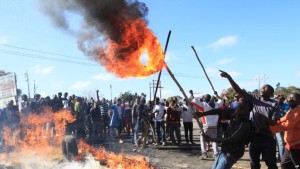The Basics · The Government · ISIS · The Opposition · Global Players
WEEKLY UPDATE
July 2, 2016
Dear Readers,
Welcome to the weekly Syria Deeply newsletter. We’ve rounded up the most important stories and developments about Syria and the Syrians in order to bring you valuable news and analysis. But first, here is a brief overview of what happened this week:
This week in Syria was marked by shifting international alliances, and events have underlined the Syrian war’s effect on the international stage. Most notably, both Turkey and the United States, two main supporters of the Syrian opposition, have signaled their desire to partner with Russia, a staunch supporter of the Syrian government.
The United States proposed new military cooperation with Russia. The proposal would see Russia working alongside the U.S. to target Jabhat al-Nusra, al-Qaida’s affiliate in Syria. In return, Russia would have to pressure the Syrian government to halt its campaign against U.S.-backed rebel groups and designate certain areas as “safe” from Syrian aerial bombing.
Turkey, a primary backer of several Syrian opposition groups, appears to also be making moves to get closer to Russia. A Russian news agency quoted Turkey’s Foreign Minister Mevlut Cavusoglu saying that the two countries should work closer together to find a political solution to the Syrian conflict.
As the U.S. and Turkey inch closer to Russia, the Syrian opposition is calling on the international community to limit Moscow’s power in the war-torn country. Syria’s main opposition body, the High Negotiations Committee (HNC) presented a detailed document to the European Union calling on them to impose sanctions on Russian companies aiding the war in Syria, specifically those that deal in arms shipments.
Some 24 NGOs, including the Syrian Civil Defense and the Syrian Network for Human Rights, threatened to quit the Geneva-based peace talks for political transition in Syria. The letter states that the ongoing fighting in Syria had made their presence at peace talks “meaningless” and “unnecessary.”
One month away from the August 1 deadline, the U.N.-brokered peace talks are far from being completed. The talks officially collapsed in late April when the HNC suspended its participation in negotiations. However, this week the U.N.’s Syrian envoy Staffan de Mistura stated that progress with political transition in Syria would still be possible by the deadline.
On Syria’s battlefields, the weekend began with a devastating attack in Deir Ezzor. At least 45 people, including children, were killed in a series of heavy airstrikes from Russian and Syrian forces on Saturday, according to the Syrian Observatory for Human Rights. The attack targeted the town of Qourieh, which is largely controlled by the so-called Islamic State group.
The battle continued in Aleppo this week. Some 70 government and rebel fighters were killed in the 24 hours leading up to Friday in Aleppo’s suburbs, as forces loyal to Syrian President Bashar al-Assad continue their campaign to seize Aleppo’s strategically significant supply lines.
The Teacher: How One Woman Educated an Entire Camp
Umm ’Abdu abandoned her education when she got married. But after the war broke out in Syria, she fled the opposition-held neighborhoods of Aleppo for government-controlled Tartus, and devoted her life to tutoring children. One day, she hopes to fulfill her dream of becoming a midwife.

Children are Fighting on All Sides of Syria’s War
Whether it is with the Free Syrian Army or the pro-government National Defense Forces militia, ISIS or the Kurds, children across the war-torn country have consistently been recruited to fight in Syria’s war.

How Hafez al-Assad Divided the Alawite Sect
It may have been 16 years since the death of former Syrian president Hafez al-Assad, but his legacy still lives on in the war-torn country’s sectarian politics.

Additional Reading:
For new reporting and analysis every weekday, visit www.newsdeeply.com/syria.
You can reach our team with any comments or suggestions at info@newsdeeply.org.
Top image: Umm ʿAbdu’s daughter, Siham, drew her own map of Syria with all the governorates on the tent where her mother teaches in government-controlled Tartus. Ghenwa Yusuf/Good Morning Syria
The original post can be found here.




